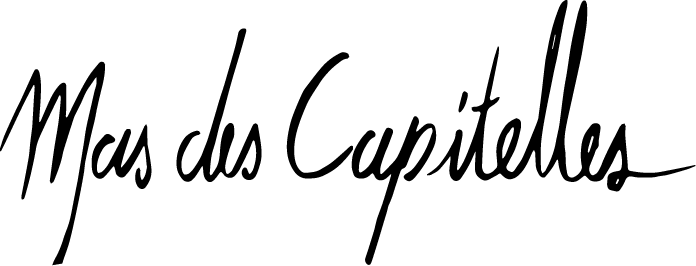Winemaking
OUR PHILOSOPHY
Convinced that great wine cannot be made without a great vineyard, we pay particular attention to how we cultivate our vines.
That’s why the 28 hectares of vines that make up the Mas des Capitelles are worked with traditional methods and in respect for the environment.
Our vineyard is characterized by a high proportion of Carignan, the fundamental grape variety used in the wines of our appellation and more generally in Languedoc Roussillon wines. This variety, often maligned in the past, allow great wines to be produced on dry and sunny hillsides, wines that are powerful, generous and in direct relation to their terroir of origin.
For this reason our family has, from generation to generation, focused its particular attention on cultivating this variety. This is demonstrated by the presence of many vines that are more than 60 years old, or some that are even more than 100 years old.
Another variety, that we especially use for the production of our wines, Mourvèdre. This variety allows to create wines of character with tastes of leather, pepper and blackcurrent, and that have remarkable aging potential.
CULTIVATION METHODS
The vineyard is fully plowed several times a year, either in a single direction or else in both directions if the spacing is sufficient. This aerates the soil properly and allows microbial life to develop.
The vines are mainly trained in traditional manner and short, 90% trained in goblets (no wires). This allows them to mature better, considering our shale-based soils, and allows us to better control the yields. This pruning also allows better foliar exposure and therefore an optimal concentration.
The harvest is entirely done manually and sorted on the vines for average yields between 20 and 30 Ho / Ha.
The choice of sorting on the vine and and not on a sorting table is guided by a our approach to winemaking; which consists of not working with and making wine from grapes that do have the right quality.
THE ENVIRONMENT
Anxious to preserve the environment and its biodiversity, the Mas des Capitelles started to evolve to organic farming on March 17 2008, which led finally in 2011 to our first certified AB-certified harvest. As a result the domain uses only products that are certified for organic farming, with no weedkillers and using only only organic fertilizers for soil enhancement.
Treatment is done mostly with sulfur and copper-based products (less than 4 kg / year / Ha).
Our domain is certified by the “Ecocert” organization.
Our vineyard is also cultivated using Biodynamics according to the methods of Rudolf Steiner, based on 500, 501 solutions and herbal preparations.
Horn dung 500, once energized, is buried in the soil to allow the development of microbial life and exchanges between the soil and the plant.
The horn silica 501, when it is applied to the aerial parts of the vine.
We also use different decotions of horsetail, nettle, wicker… that protect the vines from various fungal diseases.
This type of method of cultivation corresponds to a certain idea of viticulture, to be in harmony with nature, with living things and the different life cycles of the plant. The goal is to recreate a harmony between the soil, plants and humans.
This ancestral method of working is the same as our grandparents used.
It is based on observing and listening to nature. Simple things, which were the basis of our work, but that unfortunately over time farmers have replaced with another kind of agriculture based on “more and more yield” and where the environment, common sense and quality do not have their say.

